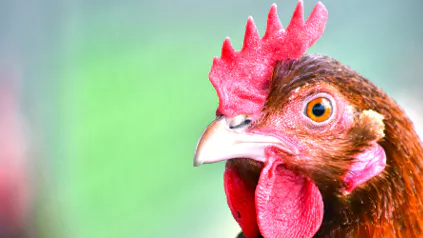

Biosecurity in Poultry Farming: Protecting Your Flock
Sep 1, 2025
Poultry farming is a dynamic and growing industry that plays a crucial role in feeding the world's population. However, the success of poultry farming heavily relies on ensuring the health and well-being of the birds. One vital aspect of achieving this goal is implementing effective biosecurity measures. In this blog, we will delve into the intriguing world of poultry biosecurity, exploring what it is, why it matters, and how it benefits both farmers and consumers.
How Diseases Enter Your Farm
Poultry diseases are stealthy invaders, capable of entering your farm in multiple ways. Understanding these potential entry points is the first step towards a robust biosecurity system:
People and Equipment: Visitors, farm workers, and equipment can carry pathogens from other locations. Strict access controls and disinfection protocols are vital.
Wildlife and Pests: Birds, rodents, and insects can transmit diseases. Regularly inspect and secure your farm against these intruders.
Contaminated Feed and Water: Infected feed and water sources can introduce diseases. Ensure a clean water supply and source feed from reputable suppliers.
Vehicles: Vehicles that enter your farm can harbor diseases. Implement a vehicle disinfection station at the farm entrance.
Understanding Biosecurity
Biosecurity refers to the set of practices and measures implemented to prevent the introduction and spread of diseases within a poultry farm. Effective biosecurity measures reduce the risk of diseases and pathogens being transmitted to or among birds. These measures are essential because poultry diseases can lead to significant economic losses and impact the food supply chain.
Biosecurity Rules
Effective biosecurity is a set of practices and protocols that create a protective shield around your poultry. Here are some fundamental biosecurity rules to follow:
Controlled Access: Restricting access to your poultry farm is a cornerstone of biosecurity. Only essential personnel and authorized visitors should be allowed in, with a clear record of who enters and exits the premises.
Sanitation and Hygiene: Maintaining a clean and disinfected environment is essential. Regular cleaning, disinfection, and providing handwashing and disinfection stations for workers and visitors are essential practices. Provide wheel dips or wheel spraying facilities at the farm entrance and only allow necessary vehicles on your farm site. Install footbaths. The purpose of foot baths is to disinfect the footwear of farm personnel and visitors before they enter or leave specific areas.
Clothing Rules: Enforce strict clothing rules for farm workers and visitors. Provide dedicated farm clothing that should not be worn off-site, reducing the risk of introducing pathogens from outside.
Remove Dead Birds Immediately: Promptly remove any dead birds from the flock. Dead birds can be a source of disease, and their removal helps prevent disease transmission within the flock.
Pest and Rodent Control: Implement measures to control pests and rodents that can transmit diseases. This includes using traps, baits, and proper storage to minimize infestations.
Visitor Guidelines: Develop visitor guidelines that include biosecurity measures. Visitors should follow protocols such as disinfecting footwear and clothing and minimizing direct contact with birds.
Education: Properly educate all farm workers on biosecurity protocols, ensuring they understand the importance of adhering to these guidelines.
Regular Audits: Conducting routine audits of your biosecurity measures helps identify weaknesses and areas for improvement.
The Importance of Poultry Biosecurity
Disease Prevention: Biosecurity measures are your first line of defense against poultry diseases. By preventing the introduction and spread of pathogens, you reduce the risk of illness among your flock.
Enhanced Flock Health: Healthy birds are more productive, leading to better egg and meat production. Biosecurity measures contribute to the overall well-being of your poultry.
Economic Savings: Implementing biosecurity can save you money by reducing the need for costly treatments and the potential loss of birds. It is an investment in the sustainability of your farm.
Sustainable Farming: Biosecurity practices align with sustainable poultry farming, contributing to food security by ensuring a consistent supply of poultry products.
Challenges and Solutions
Implementing biosecurity can be challenging. However, overcoming these challenges is possible with careful planning and dedication. Collaborating with local agricultural extension services, seeking advice from experienced companies, and staying updated on the latest biosecurity techniques are excellent ways to enhance your biosecurity efforts.
Biosecurity in poultry farming is not optional—it is a necessity. By adopting robust biosecurity measures, you are not only protecting your birds but also safeguarding the sustainability of your farm. From controlling access to maintaining hygiene and conducting regular audits, every step you take contributes to a healthier and more productive poultry flock. In an ever-evolving industry, biosecurity remains a constant factor, ensuring the well-being of your chickens and the continued satisfaction of consumers.

123POULTRY app: Managing Your Poultry Farm Data
At 123POULTRY app, we understand the importance of biosecurity in poultry farming. That is why our data management platform is designed to help you track and optimize your biosecurity measures, ensuring the health and well-being of your flock. With 123POULTRY app, you can streamline your farm management, monitor key parameters, and make data-driven decisions that contribute to the success of your poultry farm.
Discover more about 123POULTRY app.









